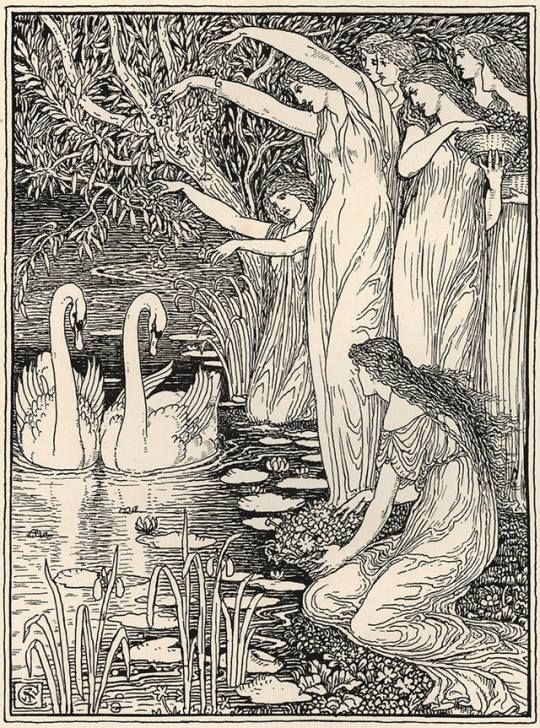
It’s a famous, striking and beautiful line I think! It is also a charming illustration! Charming, however, is not a critical word. It means simply you are attracted by the refrain and the illustration. What changes when we make a critical response?
But let me leave the question in the air while I give more information
The refrain is from the Elizabethan Edmund Spenser’s poem Prothalamion.
Prothalamion is word invented by the poet. It comes from two Greek words: pro -before and thalamion meaning bridal chamber. A forthcoming wedding is being celebrated: the double marriage of twin sisters is being held further downstream in the city . Here, up- river we are made conscious of the charms of Nature and two swans floating downstream represent the brides to be. There is a pastoral element to the poem and plenty of classical allusions but to me the artifice adds to the poem rather than chokes it.
The artifice is, at first, disguised by a curiously personal quality with the poet’s voice and mood introduced in the first stanza. He is pictured, in “sullen” mood needing the refreshment of Nature. However, the picture he paints is purely connected with the forthcoming wedding and here the pastoral element of the poem develops with the description of the nymphs bedecking themselves, and then the swans with flowers
The poet’s stance poet as narrator changes in the first stanza; changes from the personal to one reflecting that of the Muse. This is illustrated by refrain “Sweet Thames run softly while I sing my song” in which the narrator is supposed as Muse to have the authority to command the river while he presents his work.
As I say, this to me gives the poem a charm connected not with its realism but with a ready ( in my case-perhaps not in yours) acceptance of artifice and its skilful arrangement.
But see what you think in reading the first three stanzas:
Calm was the day, and through the trembling air
Sweet breathing Zephyrus didst softly play
A gentle spirit, that lightly did delay
Hot Titan's beams, which then did glister fair: (glitter)
When I whom sullen care,
Through discontent of my long fruitless stay
In Prince's court, and expectation vain
Of idle hope, which still do fly away
Like empty shadows, did afflict my brain,
Walked forth to ease my pain
Along the shore of silver streaming Thames,
Whose rutty bank, the which his river hems
Was painted all with variable flowers,
And all the meads adorned with dainty gems,
Fit to deck maidens' bowers
And crown their paramours,
Against the bridal day which is not long:
Sweet Thames run softly till I end my song.
There in a meadow by the river's side,
A flock of nymphs I chanced to espy,
All lovely Daughters of the Flood thereby,
With goodly greenish locks all loose untied,
As each had been a bride,
And each one had a little wicker basket,
Made of fine twigs entrailed curiously, (entwined)
In which they gathered flowers to fill their flasket: (a shallow basket)
And with fine Fingers, cropped full feateously ( dexterously)
The tender stalks on hye.
Of every sort which in that meadow grew,
They gathered some; the Violet pallid blue,
The little Daisy, that at evening closes,
The virgin Lily, and the Primrose true,
With sore of vermeil Roses,
To deck their Bridegrooms' poesies,
Against the Bridal day, which was not long:
Sweet Thames run softly till I end my song.
With that, I saw two swans of goodly hew,
Come softly swimming down along the lee;
Two fairer birds I yet did never see:
The snow which doth the top of Pindus strew,
Did never whiter show,
Nor Love himself when he a swan would be
For love of Leda, whiter did appear:
Yet Leda was they say as white as he,
Yet not so white as these nor nothing near;
So purely white they were,
That even the gentle stream, the which them bare, and bade his billows spare
To wet their silken feathers, least they might
Soil their fair plumes with water not so fair
And mar their beauties bright,
That shone as light,
Against their bridal day, which was not long:
Sweet Thames run softly, till I end my song.
With Spenser’s verse we associate that strain of music that runs through English verse from Spenser himself through Milton (cf. Lycidas), Keats and Tennyson. The language has a decorative quality (Flasket, feateously, entrayled, posies, meads, maidens, paramours) as opposed to a poetry that emphasises the rhythms of the speaking voice and the physicality of the language; it reflects more the Anglo-Norman French inheritance of English rather than that of Old English (Anglo-Saxon). Spenser sometimes adopts the mode of the Old English alliterative line ( In which they gathered flowers to fill their flaskets /And with fine fingers cropped full feateously.) but the words are chosen for grace rather than for their physical immediacy.
While this I find attractive I find poetry rooted in the physical- sounding more Anglo-Saxon form of English more meaningful as an elucidation or actual enactment though words of thought.
Compare with Spenser this of John Donne, for instance, in The Hill of Truth:
On a huge hill, Cragged and steep, Truth stands, and he that will Reach her, about must and about must go And what the hill's suddenness resists win so Yet strive so, that before age, death's twilight, Thy soul can rest, for none can work in that night.
The language is decidedly rooted in Old English. Huge, cragged (two syllables), steep, strive: note the strong physical words; note how the enjambment separating the complete verb “will Reach” enables the enactment of stretching; note the decisive words rhyme words ending lines. The language represents strength rather than grace ; focused thought rather than ornamentation; unexpectedness rather than convention .
What do you think? Do you tend towards one or the other?